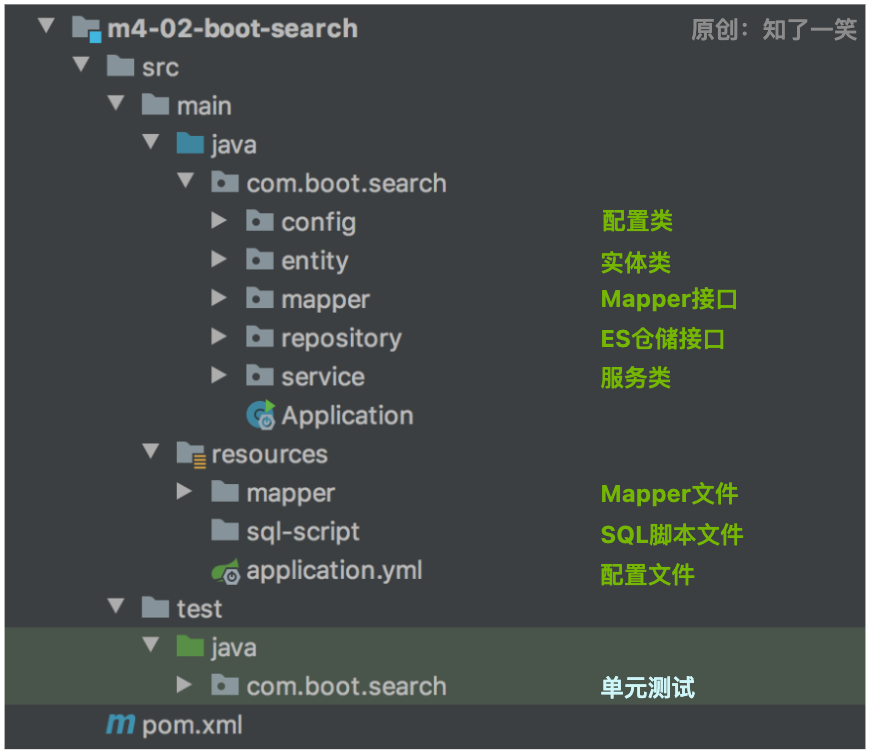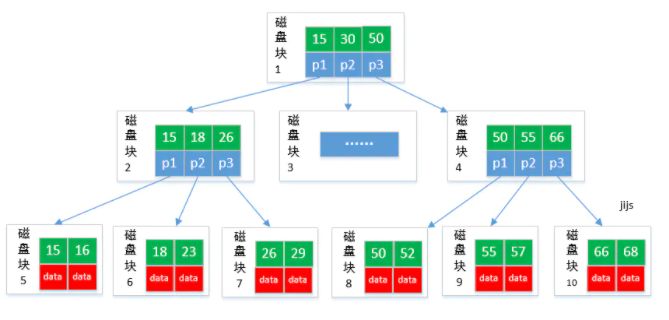一、简介
Elasticsearch是一个分布式、RESTful风格的搜索和数据分析引擎,适用于各种数据类型,数字、文本、地理位置、结构化数据、非结构化数据;
在实际的工作中,历经过Elasticsearch从6.0到7.0的版本升级,而这次SpringBoot3和ES8.0的集成,虽然脚本的语法变化很小,但是Java客户端的API语法变化很大;
二、环境搭建
1、下载安装包
需要注意的是,这些安装包的版本要选择对应的,不然容易出问题;
软件包:elasticsearch-8.8.2-darwin-x86_64.tar.gz
分词器工具:elasticsearch-analysis-ik-8.8.2.zip
可视化工具:kibana-8.8.2-darwin-x86_64.tar.gz
2、服务启动
不论是ES还是Kibana,在首次启动后,会初始化很多配置文件,可以根据自己的需要做相关的配置调整,比如常见的端口调整,资源占用,安全校验等;

1、启动ES
elasticsearch-8.8.2/bin/elasticsearch
本地访问:localhost:9200
2、启动Kibana
kibana-8.8.2/bin/kibana
本地访问:http://localhost:5601
# 3、查看安装的插件
http://localhost:9200/_cat/plugins -> analysis-ik 8.8.2
三、工程搭建
1、工程结构

2、依赖管理
在starter-elasticsearch组件中,实际上依赖的是elasticsearch-java组件的8.7.1版本;
<dependency>
<groupId>org.springframework.boot</groupId>
<artifactId>spring-boot-starter-data-elasticsearch</artifactId>
<version>${spring-boot.version}</version>
</dependency>
3、配置文件
在上面环境搭建的过程中,已经禁用了用户和密码的登录验证,配置ES服务地址即可;
spring:
# ElasticSearch配置
elasticsearch:
uris: localhost:9200
四、基础用法
1、实体类
通过Document和Field注解描述ES索引结构的实体类,注意这里JsonIgnoreProperties注解,解决索引中字段和实体类非一一对应的而引起的JSON解析问题;
@JsonIgnoreProperties(ignoreUnknown = true)
@Document(indexName = "contents_index", createIndex = false)
public class ContentsIndex implements Serializable {
private static final long serialVersionUID=1L;
@Field(type= FieldType.Integer)
private Integer id;
@Field(type= FieldType.Keyword)
private String title;
@Field(type= FieldType.Keyword)
private String intro;
@Field(type= FieldType.Text)
private String content;
@Field(type= FieldType.Integer)
private Integer createId;
@Field(type= FieldType.Keyword)
private String createName;
@Field(type= FieldType.Date,format = DateFormat.date_hour_minute_second)
private Date createTime;
}
2、初始化索引
基于ElasticsearchTemplate类和上述实体类,实现索引结构的初始化,并且将tb_contents表中的数据同步到索引中,最后通过ID查询一条测试数据;
@Service
public class ContentsIndexService {
private static final Logger log = LoggerFactory.getLogger(ContentsIndexService.class);
@Resource
private ContentsService contentsService ;
@Resource
private ElasticsearchTemplate template ;
/**
* 初始化索引结构和数据
*/
public void initIndex (){
// 处理索引结构
IndexOperations indexOps = template.indexOps(ContentsIndex.class);
if (indexOps.exists()){
boolean delFlag = indexOps.delete();
log.info("contents_index exists,delete:{}",delFlag);
indexOps.createMapping(ContentsIndex.class);
} else {
log.info("contents_index not exists");
indexOps.createMapping(ContentsIndex.class);
}
// 同步数据库表记录
List<Contents> contentsList = contentsService.queryAll();
if (contentsList.size() > 0){
List<ContentsIndex> contentsIndexList = new ArrayList<>() ;
contentsList.forEach(contents -> {
ContentsIndex contentsIndex = new ContentsIndex() ;
BeanUtils.copyProperties(contents,contentsIndex);
contentsIndexList.add(contentsIndex);
});
template.save(contentsIndexList);
}
// ID查询
ContentsIndex contentsIndex = template.get("10",ContentsIndex.class);
log.info("contents-index-10:{}",contentsIndex);
}
}
3、仓储接口
继承ElasticsearchRepository接口,可以对ES这种特定类型的存储库进行通用增删改查操作;在测试类中对该接口的方法进行测试;
// 1、接口定义
public interface ContentsIndexRepository extends ElasticsearchRepository<ContentsIndex,Long> {
}
// 2、接口测试
public class ContentsIndexRepositoryTest {
@Autowired
private ContentsIndexRepository contentsIndexRepository;
@Test
public void testAdd (){
// 单个新增
contentsIndexRepository.save(buildOne());
// 批量新增
contentsIndexRepository.saveAll(buildList()) ;
}
@Test
public void testUpdate (){
// 根据ID查询后再更新
Optional<ContentsIndex> contentsOpt = contentsIndexRepository.findById(14L);
if (contentsOpt.isPresent()){
ContentsIndex contentsId = contentsOpt.get();
System.out.println("id=14:"+contentsId);
contentsId.setContent("update-content");
contentsId.setCreateTime(new Date());
contentsIndexRepository.save(contentsId);
}
}
@Test
public void testQuery (){
// 单个ID查询
Optional<ContentsIndex> contentsOpt = contentsIndexRepository.findById(1L);
if (contentsOpt.isPresent()){
ContentsIndex contentsId1 = contentsOpt.get();
System.out.println("id=1:"+contentsId1);
}
// 批量ID查询
Iterator<ContentsIndex> contentsIterator = contentsIndexRepository
.findAllById(Arrays.asList(10L,12L)).iterator();
while (contentsIterator.hasNext()){
ContentsIndex contentsIndex = contentsIterator.next();
System.out.println("id="+contentsIndex.getId()+":"+contentsIndex);
}
}
@Test
public void testDelete (){
contentsIndexRepository.deleteById(15L);
contentsIndexRepository.deleteById(16L);
}
}
4、查询语法
无论是ElasticsearchTemplate类还是ElasticsearchRepository接口,都是对ES常用的简单功能进行封装,在实际使用时,复杂的查询语法还是依赖ElasticsearchClient和原生的API封装;
这里主要演示七个查询方法,主要涉及:ID查询,字段匹配,组合与范围查询,分页与排序,分组统计,最大值查询和模糊匹配;更多的查询API还是要多看文档中的案例才行;
public class ElasticsearchClientTest {
@Autowired
private ElasticsearchClient client ;
@Test
public void testSearch1 () throws IOException {
// ID查询
GetResponse<ContentsIndex> resp = client.get(
getReq ->getReq.index("contents_index").id("7"), ContentsIndex.class);
if (resp.found()){
ContentsIndex contentsIndex = resp.source() ;
System.out.println("contentsIndex-7:"+contentsIndex);
}
}
@Test
public void testSearch2 () throws IOException {
// 指定字段匹配
SearchResponse<ContentsIndex> resp = client.search(searchReq -> searchReq.index("contents_index")
.query(query -> query.match(field -> field
.field("createName").query("张三"))),ContentsIndex.class);
printResp(resp);
}
@Test
public void testSearch3 () throws IOException {
// 组合查询:姓名和时间范围
Query byName = MatchQuery.of(field -> field.field("createName").query("王五"))._toQuery();
Query byTime = RangeQuery.of(field -> field.field("createTime")
.gte(JsonData.of("2023-07-10T00:00:00"))
.lte(JsonData.of("2023-07-12T00:00:00")))._toQuery();
SearchResponse<ContentsIndex> resp = client.search(searchReq -> searchReq.index("contents_index")
.query(query -> query.bool(boolQuery -> boolQuery.must(byName).must(byTime))),ContentsIndex.class);
printResp(resp);
}
@Test
public void testSearch4 () throws IOException {
// 排序和分页,在14条数据中,根据ID倒序排列,从第5条往后取4条数据
SearchResponse<ContentsIndex> resp = client.search(searchReq -> searchReq.index("contents_index")
.from(5).size(4)
.sort(sort -> sort.field(sortField -> sortField.field("id").order(SortOrder.Desc))),ContentsIndex.class);
printResp(resp);
}
@Test
public void testSearch5 () throws IOException {
// 根据createId分组统计
SearchResponse<ContentsIndex> resp = client.search(searchReq -> searchReq.index("contents_index")
.aggregations("createIdGroup",agg -> agg.terms(term -> term.field("createId"))),ContentsIndex.class);
Aggregate aggregate = resp.aggregations().get("createIdGroup");
LongTermsAggregate termsAggregate = aggregate.lterms();
Buckets<LongTermsBucket> buckets = termsAggregate.buckets();
for (LongTermsBucket termsBucket : buckets.array()) {
System.out.println(termsBucket.key() + " : " + termsBucket.docCount());
}
}
@Test
public void testSearch6 () throws IOException {
// 查询最大的ID
SearchResponse<ContentsIndex> resp = client.search(searchReq -> searchReq.index("contents_index")
.aggregations("maxId",agg -> agg.max(field -> field.field("id"))),ContentsIndex.class);
for (Map.Entry<String, Aggregate> entry : resp.aggregations().entrySet()){
System.out.println(entry.getKey()+":"+entry.getValue().max().value());
}
}
@Test
public void testSearch7 () throws IOException {
// 模糊查询title字段,允许1个误差
Query byContent = FuzzyQuery.of(field -> field.field("title").value("设计").fuzziness("1"))._toQuery();
SearchResponse<ContentsIndex> resp = client.search(
searchReq -> searchReq.index("contents_index").query(byContent),ContentsIndex.class);
printResp(resp);
}
private void printResp (SearchResponse<ContentsIndex> resp){
TotalHits total = resp.hits().total();
System.out.println("total:"+total);
List<Hit<ContentsIndex>> hits = resp.hits().hits();
for (Hit<ContentsIndex> hit: hits) {
ContentsIndex contentsIndex = hit.source();
System.out.println(hit.id()+":"+contentsIndex);
}
}
}
转载至:https://www.cnblogs.com/cicada-smile/p/17632955.html




